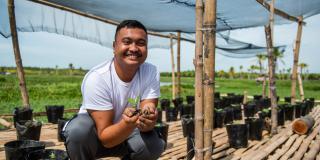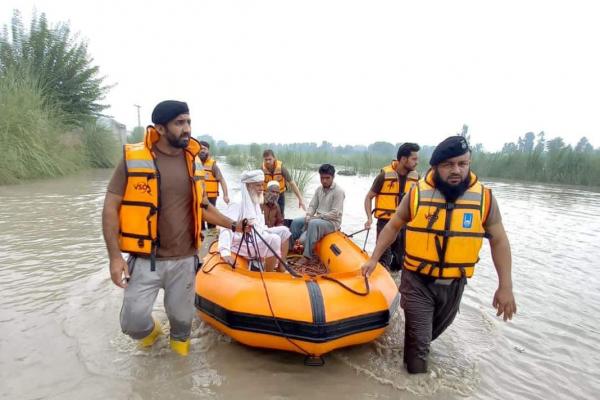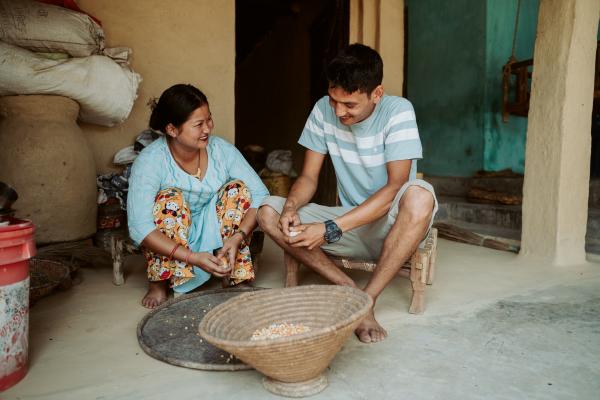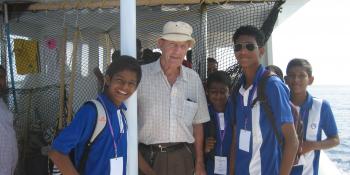
The role of active citizenship in driving positive change
All across the world, the opportunities that ordinary citizens have to raise their voices are being taken away.1 Rights that people once took for granted, to a free media, to challenge local decision makers, to peacefully protest, are disappearing. In a context where global inequalities are rising and the impacts of the climate crisis are becoming more devastating, this is having a disproportionate impact on people who are living in extreme poverty.
Yet in every village, town and city you will find examples of people responding to the challenges that face their communities – from the first responders to natural disasters in Pakistan to the volunteers promoting safe hygiene messages during COVID-19, people are stepping up to take action.
This incredible resource of volunteers (an estimated one billion of them) are making a vital contribution to the delivery of the Sustainable Development Goals, but they are also stepping up to question, to challenge, to hold decision makers to account for their actions.
Volunteering, when well-managed and supported, becomes an essential part of the journey towards active citizenship.2 It instils agency, enhances personal value, and fosters skills, empathy and a sense of connection that in turn, creates a ripple effect that brings about positive change. Volunteering is not purely an act of kindness. It can be a transformational act leading to transformational outcomes. This was illustrated during one of the largest ever studies of the impacts of volunteering on development outcomes.

Active citizenship is crucial in catalysing sustainable change on a larger scale. It is about individuals actively coming together within communities to contribute to their improvement. By becoming active participants in civic life, people stake a claim in society and are able to seize the opportunity to become drivers of change and progress. When governments are held accountable and supported to engage with citizens, it enhances their effectiveness in responding to people’s needs and dreams.
Across VSO’s programmes, we work from communities up to government ministries to connect the voices of the marginalised people we work with, to decision makers. Our volunteers are embedded in communities, working alongside people to realise their rights and build active citizenship.
They build the capability, agency and voice of marginalised people and civil society to demand better access to services and hold decision makers to account. At the same time, those volunteers build the ability of government agencies and service providers to respond to these demands. The vast majority of our volunteers derive from the country and communities where they are working.
From the young people demanding more relevant sexual health services in rural Zambia, to women in Nepal being supported to confront gender-based violence, VSO is seeing how these demands are being met and how public services are improving as a result of listening to the voices of these active citizens.
Active citizenship is not a given for everyone. Many vulnerable individuals and marginalised communities feel powerless. Even those with advantages may perceive their impact as inconsequential. Organisations, with the best of intentions, sometimes inadvertently reinforce this sense of powerlessness by treating people as passive beneficiaries instead of active agents of change.
While active citizenship is transformative, it requires effective support to build the confidence and capacity of individuals and communities. To harness the full potential of volunteering, VSO has spearheaded the development of the Global Standard for Volunteering for Development.

This framework sets out guidelines for responsible and impactful volunteering. By working with governments, civil society organisations, and businesses, VSO supports the development of national policies, regional platforms, and local opportunities for youth to engage in critical areas like education, healthcare and employment. These efforts remove barriers, empowering individuals to exercise their agency and make a real difference at scale.
Recognising the profound impact of active citizenship and volunteering, organisations like VSO are dedicated to empowering individuals worldwide. VSO has developed youth networks spanning 18 countries, with tens of thousands of young people trained and mobilised as active citizens, advocating for causes that resonate with them.
One remarkable example of youth advocacy work is on climate change. In Bangladesh, climate resilient initiatives led by volunteer youth trainers in climate-smart agriculture have raised awareness and mobilised communities to take action against deforestation and harmful practices. Similarly, in Kenya, volunteer climate youth champions are creating awareness, conducting research, and organising webinars on climate-resilient agriculture, ensuring a sustainable future for food and farming.
Active citizenship is a powerful force, that drives positive change and contributes to fairer societies worldwide. It is crucial that governments and civil society organisations recognise the importance of supporting active citizenship as a central practice for delivering systems change. Through active engagement, empathy and responsible volunteering, we can transform society, creating vibrant, inclusive and accountable communities.
Footnotes
Read more

Transforming lives through education: Geoffrey’s VSO legacy
With a deep belief in the transformative power of education, Geoffrey from Norfolk, UK, has devoted his life both in the UK and abroad to making education more accessible for all.
